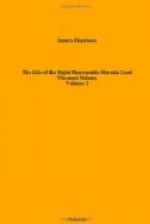“Palermo, April 25,1799.
“MY DEAR TROUBRIDGE,
“I thank you, again and again, for your letters, and for the ability and exertion you shew on all occasions. As to Mr. judge, he must hang, or let it alone, as he pleases. It has been that miserable system, which has caused much of the present misery in Naples. In respect to the cardinal, he is a swelled up priest. If his letter had been directed to you, his answer would, I am sure, been proper. Such impertinence, in treating of the assistance of England, deserves reprobation. He makes his army great or small, as it suits his convenience. He is now frightened at a thousand men going against him: which, at one time, is thirty thousand; at another, not three thousand. In short, my dear friend, without foreign troops, the stream will sometimes run different ways. Some Russian ships are said to be at Otranto; but, we know less than you. If the Austrian armies are beaten, Naples will be lost; if victorious, our exertions, with the constant loyalty of the lower order, will hasten the king’s return. What are your ideas of the king’s going into the Bay of Naples, without foreign troops? If it should cause an insurrection in Naples, which did not succeed, would it not be worse? The king, if a rising of loyal people took place, ought to be amongst them; and, that he will never consent to. Alphonso is going to Tripoli; the bashaw has taken another twist. Lord Spencer disavows the conduct of Sir William Sidney Smith, as being in any manner independent of me. What will his lordship say, when he reads the passports? Your wants and wishes shall, as far as I am able, be complied with. Your bill for extra expences, if the court will not pay, I will answer for. With kind remembrances, &c.
“Nelson.”
The mode adopted by Lord Nelson, with regard to the Bashaw of Tripoli, on this occasion, was a master-stroke of policy. In order not to commit the country, with too much precipitation, though resolved to act with all requisite energy at the moment, his lordship employed a Portuguese ship in the business, and selected that of Commodore Campbell for this confidential service. His knowledge of mankind taught him, that this officer would not fail to feel gratified by the honour of such a mission; consequently, be induced to execute it with his best ability. Simon Lucas, Esq. his Britannic Majesty’s consul at Tripoli, had found it expedient to quit that court for Palermo: but he consented to return with Commodore Campbell, in order to assist the negociation; and, should it appear advisable, to resume there his ministerial functions. The letter which Lord Nelson sent by Commodore Campbell is much too curious to be omitted. It is, indeed, highly characteristic of it’s able author.
“Palermo, 28th April 1799.
“SIR,




